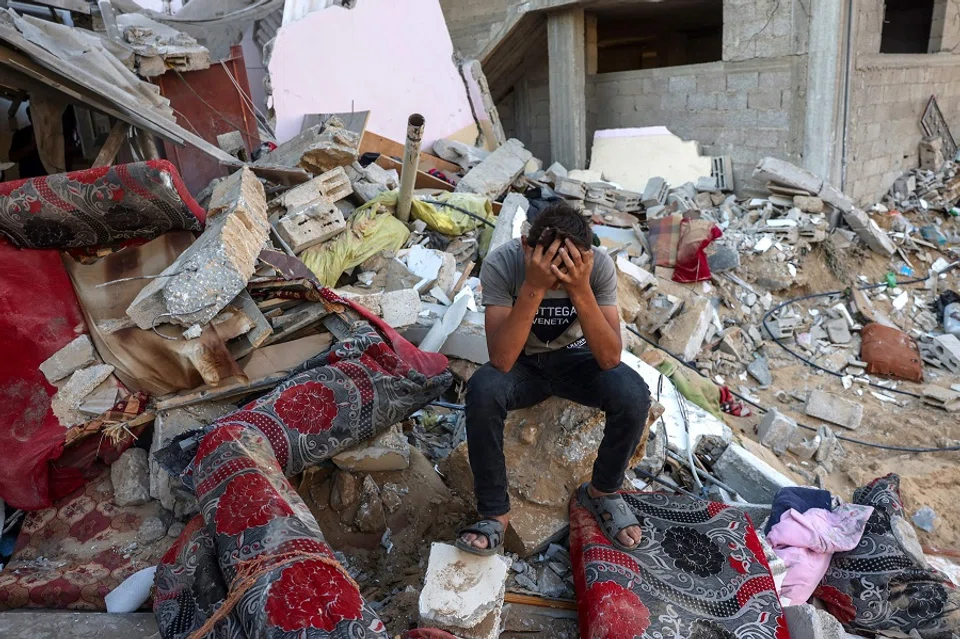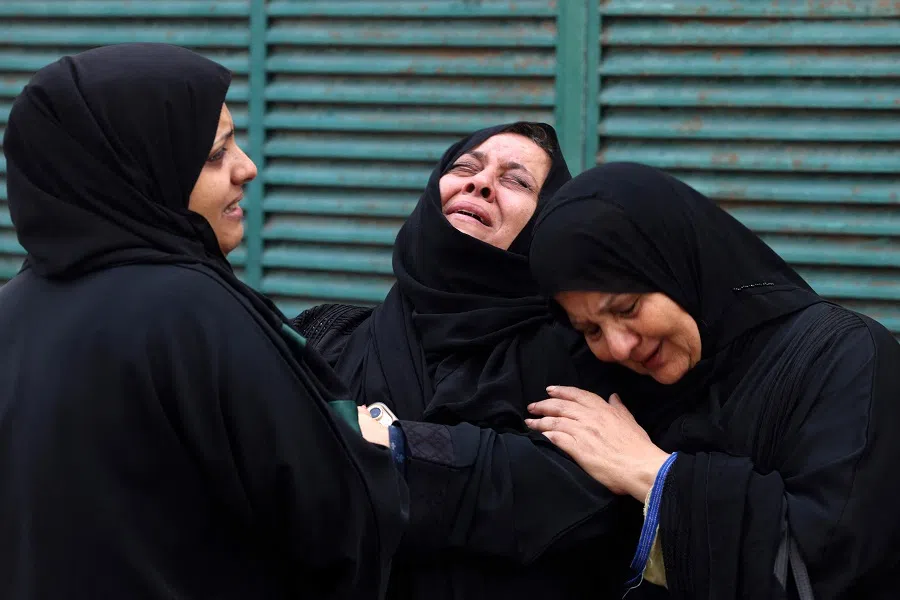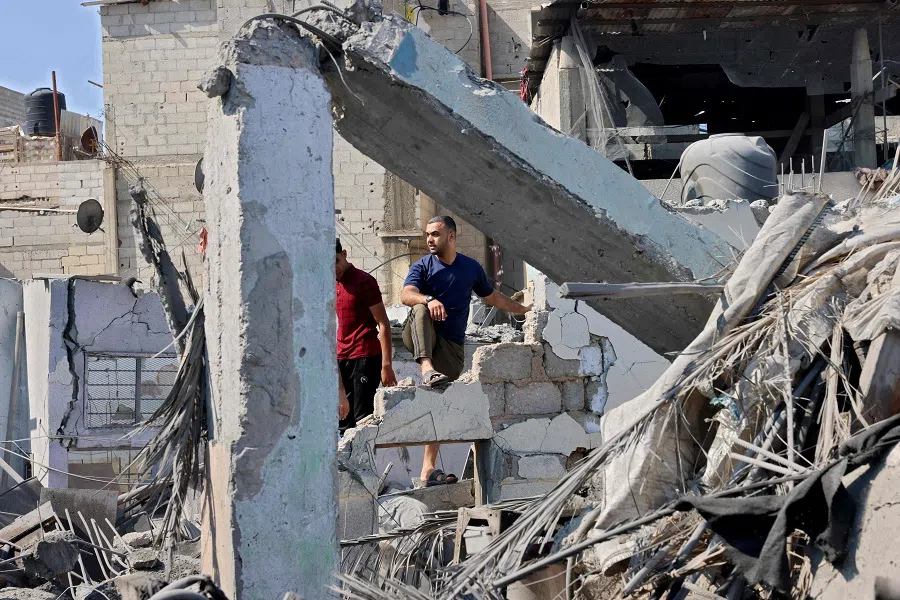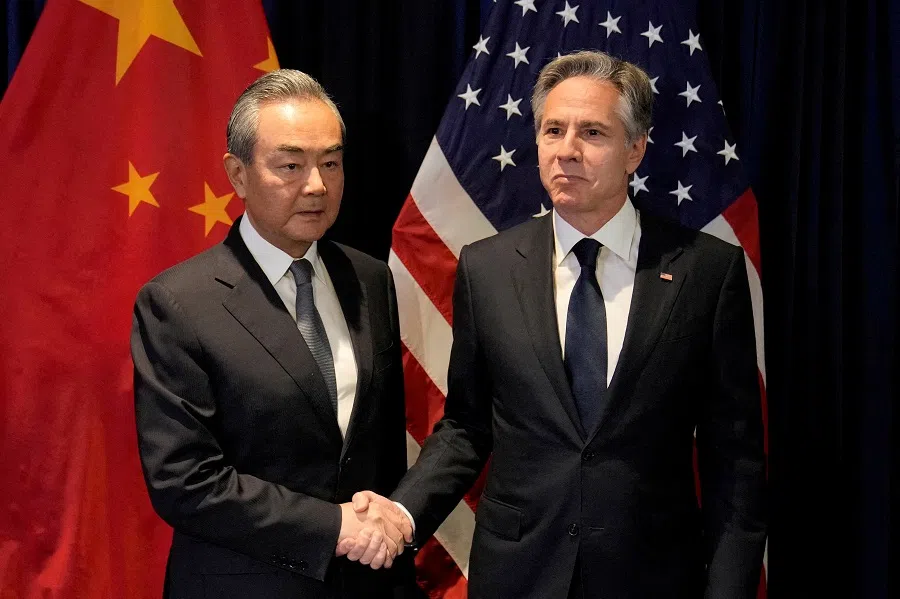China shifts stance on Israel-Hamas conflict?
A week after the war between Israel and Hamas broke out, China has openly criticised Israel, saying that its actions "have gone beyond self-defence". China may be worried about the larger implications of war breaking out in the Middle East, says an academic that Lianhe Zaobao correspondent Edwin Ong spoke to.

A week after the outbreak of the Israel-Hamas conflict, Chinese Foreign Minister Wang Yi publicly criticised Israel for the first time on 14 October, asserting that Israel is acting beyond the scope of self-defence and should stop its collective punishment of Gaza civilians.
Wang's open criticism
An interviewed academic assessed that Wang's latest remarks illustrate that Beijing's diplomatic stance towards the Israel-Hamas conflict has fundamentally changed, and that the country is expressing unprecedented concern that Israel's planned destruction of Hamas could trigger a new round of war and chaos in the Middle East.
Based on a Chinese foreign ministry readout, Wang, who is also a member of the Politburo of the Chinese Communist Party and director of the Office of the Central Commission for Foreign Affairs, reiterated on 14 October during a phone conversation with Saudi Arabian Foreign Minister Faisal bin Farhan Al Saud that Beijing opposes and condemns all acts that harm civilians.
Furthermore, Wang asserted that "Israel's actions have gone beyond self-defence and it should heed the call of the international community and the Secretary-General of the United Nations to stop its collective punishment of the people in Gaza".
This is the first time Wang has directly criticised Israel since openly speaking about the Israel-Hamas conflict five times in the past week. But he has yet to explicitly condemn Hamas, which launched an attack on Israel on 7 October.

This is the first time Wang has directly criticised Israel since openly speaking about the Israel-Hamas conflict five times in the past week. But he has yet to explicitly condemn Hamas, which launched an attack on Israel on 7 October.
On 14 October, Wang also urged all parties to return to the negotiating table as soon as possible for the first time, saying that Beijing is in intensive communication with all parties to push for a ceasefire and an end to the fighting. He added that China believes that the historical injustices against Palestine have lasted for more than half a century and can no longer continue; all countries should make clear calls for the implementation of the two-state solution as soon as possible.
Professor Zhu Feng, director of Nanjing University's Institute of International Relations, told Lianhe Zaobao that Wang's open criticism of Israel indicates China's "unprecedented concern" that Israel's further military attacks against Hamas in Gaza could trigger a new round of war in the Middle East. This would not only lead to massive civilian casualties but could also escalate military conflicts in the region. At the same time, the outside world is also concerned about whether Iran, which supports Hamas, will intervene.
Impact on the world and China
During a phone conversation with Iranian Foreign Minister Hossein Amir-Abdollahian on 15 October, Wang stressed the pressing need to de-escalate tensions and prevent a humanitarian disaster in the Gaza Strip before it further jeopardises the Middle East peace process. Wang also pointed out that the exercise of the right to self-defence should comply with international law and international humanitarian law, including the protection of the safety of civilians and hostages.
Zhu also opined that if war were to break out in the Middle East, it would worsen the energy supply crisis for the global economy, which will be detrimental for China. It could also further the contradictions and antagonisms of the Ukraine war.

Zhu analysed that the divided opinions among the international community surrounding the current round of Israel-Palestine conflict has not been seen in years. The historical roots behind the war in the Middle East is also once again being discussed.
Israel's constant expansion of Jewish settlements and its encroachment into the residential areas of the Palestinians has led to a suppression of their living space, thus "igniting unprecedented international backlash," Zhu stated. Europe on the other hand is worried about a new influx of refugees, further deepening cross-regional turmoil.
Zhu also opined that if war were to break out in the Middle East, it would worsen the energy supply crisis for the global economy, which will be detrimental for China. It could also further the contradictions and antagonisms of the Ukraine war.
He added, "China is very concerned about these issues, which is why there is a fundamental change in Wang Yi's recent statements compared with the relatively mild position undertaken by the Chinese foreign ministry at the start."
Big nations' responsibilities
Chinese Foreign Minister Wang Yi and US Secretary of State Antony Blinken exchanged calls for the first time on 14 October since Hamas's attack on Israel. Wang expressed that the conflict is escalating continuously and is at the risk of losing control, that military options lead to nowhere, and that repaying violence with violence only creates vicious cycles.
... as well as Wang Yi openly putting pressure on Israel, all point towards the fact that on the whole, China is still invested in encouraging peaceful resolution and pushing for talks. - Professor Zhu Feng, Nanjing University

Wang called on the US to play a constructive role in bringing the issue back on the track of political settlement at the earliest date.
Zhai Jun, special envoy of the Chinese government on the Middle East issue, spoke with Palestine, Israel, Egypt, Saudi Arabia and the United Arab Emirates over the past week, and he stated during a CCTV programme (《蓝厅观察》) on 14 October that he would visit the Middle East next week to coordinate with various parties for a "ceasefire, to protect civilians, ease the situation, and promote peace talks".
Zhai stated that the prospect of further broadening and outward spillover of the conflict was deeply worrying. He revealed that there were already four Chinese nationals dead, six injured and two missing due to the conflict.
Zhu opined that Zhai's announcement of his visit after meeting with diplomatic envoys of the members of the League of Arab States on 13 October, as well as Wang Yi openly putting pressure on Israel, all point towards the fact that on the whole, China is still invested in encouraging peaceful resolution and pushing for talks.
Zhu added that the turmoil in the Middle East also provides an opportunity for both China and the US to cooperate more closely with one another, to collectively shoulder the responsibilities of big nations.
This article was first published in Lianhe Zaobao as "王毅最新表态显示 北京对以哈冲突的外交姿态已出现根本变化".



![[Big read] When the Arctic opens, what happens to Singapore?](https://cassette.sphdigital.com.sg/image/thinkchina/da65edebca34645c711c55e83e9877109b3c53847ebb1305573974651df1d13a)
![[Video] George Yeo: America’s deep pain — and why China won’t colonise](https://cassette.sphdigital.com.sg/image/thinkchina/15083e45d96c12390bdea6af2daf19fd9fcd875aa44a0f92796f34e3dad561cc)
